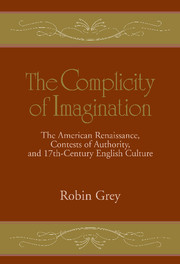 The Complicity of Imagination
The Complicity of Imagination Published online by Cambridge University Press: 05 November 2009
The Poetics of Probability: John Locke, Sir Thomas Browne, and the Marvelous
Recent critics have examined how Melville's fiction and the American political “romance” exploited a common ideological language, one converging on such issues as national expansion, the frontier, and race relations. Others have investigated the participation of Melville's novels and mid-century popular fiction in social reform discourse subversive of conventional and elite values. But we have yet to discern how Melville's writings, by engaging with the mid-century Northeastern culture's rationalist assumptions – its nexus of empirical biases, liberal theological values, political agendas, and literary tastes – were able to fashion critiques of Whig values in the culture's own rationalist vocabulary. Evert Duyckinck's fears about Ishmael (see Chapter 1) illustrate the social and political “dangers” that Americans perceived in transcendentalism and in the rationalist extremes of European deism and atheism. But Melville, disposed neither toward Lockenor toward transcendentalism, explores the implications and reveals the dangers of Britain's “safer” rationalism (both English and Scottish) embraced by America. Indeed, we should remember that in his analogy of two whales hoisted and secured to either side of the Pequod, Ishmael laments the burden of both Lockean and transcendental philosophical biases: “So, when on one side you hoist in Locke's head, you go over that way; but now, on the other side, hoist in Kant's and you come back again; but in very poor plight. Thus, some minds for ever keep trimming boat. Oh, ye foolish! throw all these thunder-heads overboard, and then you will float light and right.”
To save this book to your Kindle, first ensure [email protected] is added to your Approved Personal Document E-mail List under your Personal Document Settings on the Manage Your Content and Devices page of your Amazon account. Then enter the ‘name’ part of your Kindle email address below. Find out more about saving to your Kindle.
Note you can select to save to either the @free.kindle.com or @kindle.com variations. ‘@free.kindle.com’ emails are free but can only be saved to your device when it is connected to wi-fi. ‘@kindle.com’ emails can be delivered even when you are not connected to wi-fi, but note that service fees apply.
Find out more about the Kindle Personal Document Service.
To save content items to your account, please confirm that you agree to abide by our usage policies. If this is the first time you use this feature, you will be asked to authorise Cambridge Core to connect with your account. Find out more about saving content to Dropbox.
To save content items to your account, please confirm that you agree to abide by our usage policies. If this is the first time you use this feature, you will be asked to authorise Cambridge Core to connect with your account. Find out more about saving content to Google Drive.